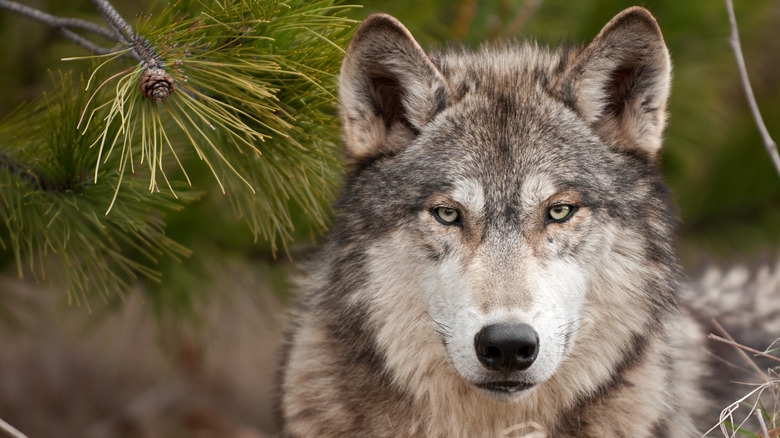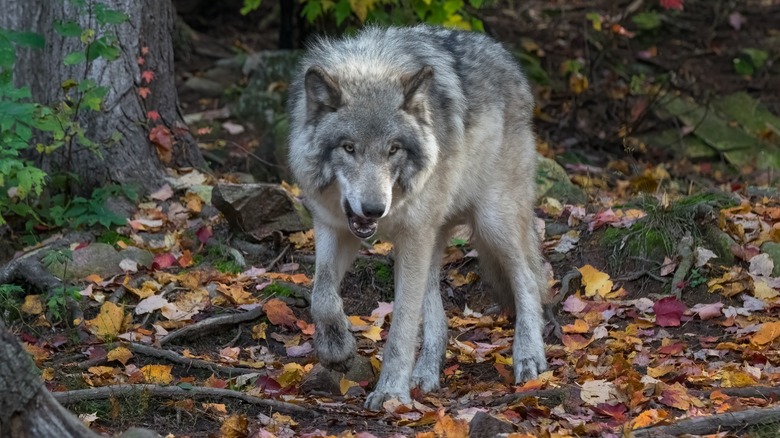Keep Wolves Away From Your Campsite With These Straightforward Tips
In the minds of many campers, wolves are an outdated threat — one that faded away with the frontier and the rugged woodsmen that pioneered exploration in North America. Wolf numbers certainly dipped in the 1900s, especially in the United States where both gray and red wolves found themselves on the endangered species lists. However, the continent is still home to a surprisingly high number of these fabled feral canines, including some of the most dangerous types of wolves.
Thanks to conservation efforts, the United States has seen the number of gray wolves slowly begin to climb. The species actually repopulated so well that it was removed from the endangered species list in 2021 and a handful of northern states are even allowing hunters to harvest them. Canada, on the other hand, is actually home to the second-largest wolf population in the world (second only to Russia), per the International Fund for Animal Welfare. Therefore, if you plan on overnighting in the northern or western United States — where some of the most-visited campgrounds happen to be — or almost anywhere in Canada, wolves remain a very real concern. While it is important to know what to do if you run into a wolf in the woods, it is equally important to know how to keep wolves away from your campsite.
Clean campsites discourage wolves from visiting
While wolf attacks on humans are rare, averaging only a bit more than one a year (per the International Wolf Center), they are still considered a dangerous animal and hardly what you want to wake up to wandering through your camp. So how do you keep wolves away from your campsite? Actually, just by doing what you should already be doing so you don't attract bears and other animals into your camp. The overriding theme is to keep your campsite tidy, clean, and organized. Do not leave food out or store it in close proximity to your tent. Additionally, do all camp cooking a safe distance away, and do not toss out or burn leftover food. Keep toiletries and other scented products hanging from high tree limbs away from tents. Because wolves, like dogs, are curious and often take odd objects, it is also a good idea to gather all loose items and pack them away in your tent.
Camping with pets is an additional risk in wolf territory. The best bet if you're venturing into areas where wolves are known to be present is to leave your dog at home. If, however, you are intent on taking them, always keep them on a leash and keep them with you. Do not leave dogs unattended, even if they are chained to a stake or tree, as wolves may see them as a threat and attack. Supervise your dogs while they eat, and then seal any uneaten food in an airtight container.
What to do if a wolf comes into your campsite
Handling a wolf encounter in your campsite or on the trail is much the same as dealing with a black bear or coyote. These animals are typically skittish of humans and tend to run away. If they don't run when they see you, you shouldn't either, as running may trigger an attack. Instead, stand your ground and employ many of the same techniques used for hazing coyotes (no, not human hazing!). These include making noise, waving your arms, tossing rocks or sticks, flashing lights, and using noise makers to try and drive them away. The Washington Department of Fish and Wildlife also suggests utilizing non-lethal armaments and munitions such as starter pistols, paintballs, or rubber bullets to scare away wolves. If it refuses to leave, slowly make your way to your vehicle or a secure building, such as a campground restroom, and alert wildlife authorities.
Additionally, measures to keep in mind while in wolf country include keeping a safe distance from wolves and never feeding them. If you do see a wolf in your campsite, do not attempt to lure it closer with food in order to get a photo — and never try to handle or pet it.


